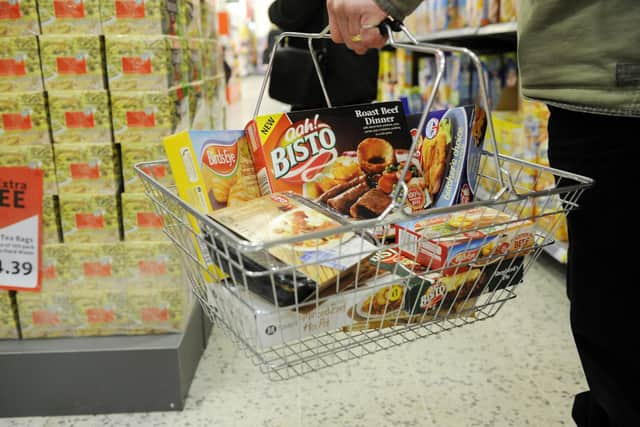Inflation headache: More interest rate pain on horizon as 'brutal economic struggle' continues
Inflation may have cooled last month on the back of lower fuel prices but remained above 10 per cent as household budgets continue to come under pressure. The annual measure of consumer prices index (CPI) inflation dipped back to 10.1 per cent in March, having risen to 10.4 per cent in February from January’s 10.1 per cent rate.
The latest figure is a full percentage point below October’s 41-year peak of 11.1 per cent but inflation is proving stubbornly sticky and question marks remain over whether the Chancellor can meet his pledge to halve inflation by the end of this year. The Office for Budget Responsibility (OBR) is projecting an even lower rate of just 2.9 per cent by the close of 2023.
Advertisement
Hide AdAdvertisement
Hide AdEconomists had forecast inflation would fall back to 9.8 per cent in March and its stickiness continues to heap pressure on the Bank of England regarding interest rates, as policymakers attempt to get inflation back to their 2 per cent target level.
Wes Wilkes, chief executive at wealth manager Net-Worth Ntwrk, said the March inflation data significantly increased the risk of recession - something the UK economy has avoided for now as it teeters around the zero-growth mark. “UK inflation may have fallen from 10.4 per cent to 10.1 per cent but it remains stubbornly high and this means that the Bank of England’s monetary policy committee will almost certainly remain steadfast in raising rates as it is their only tool to manage this,” he said. “This significantly increases the risk of recession in the UK. It also means tighter and more restrictive borrowing for individuals and businesses alike. The brutal economic struggle, which we have been in for over three years since the pandemic, continues.”
Releasing its latest inflation data, the Office for National Statistics (ONS) revealed that food prices increased by 19.1 per cent year-on-year, the sharpest jump since August 1977. Bread, cereals and fruit prices increased, while the impact of vegetable shortages also continued to weigh on inflation. Clothing and footwear prices rose by 7.2 per cent year-on-year, although this represented a slight slowdown against February’s data. On the flip side, petrol and diesel costs were down 5.9 per cent compared to the same month last year after prices had spiked following Russia’s invasion of Ukraine.
Ed Monk, associate director, personal investing at Fidelity International, said the UK’s inflation headache was proving much more intense than in Europe and the US, where the rate recently fell back to 5 per cent. Brexit-related supply chain issues could be one factor. “The strain on households shows little sign of easing with yet another reading of headline inflation above 10 per cent. This isn’t how it was supposed to go,” Monk noted. “It’s now clear the UK has an inflation problem that is worse and more persistent than in Europe and the US. Price rises here are proving more difficult to neutralise and the Bank of England will almost certainly add at least one more quarter-point hike to borrowing costs. There has to be a question as to whether it feels that will be sufficient. The government promises to halve inflation, and the OBR forecast it hitting 2.9 per cent by the year’s end - both look a long way off.”
Luke Bartholomew, senior economist at Scottish investment giant Abrdn, said a further quarter point increase in the base interest rate was likely next month. He said: “The May policy decision has always been finely balanced, but the combination of the ambivalent signals from [this week’s] wage data and the strength of inflation means that the majority of policy makers will probably feel that more tightening is required. However, inflation is still set to fall rapidly this year. Powerful base effects will almost automatically significantly reduce inflation, while ongoing economic stagnation will also weigh on inflation.”


Economists have predicted that stubborn inflation will drop more sharply from April amid a decline in energy prices, although the continued “price cap” at £2,500 annually for a typical home means households will likely feel little change.
ING developed markets economist James Smith believes the inflation stickiness will not last given improving supply chains, lower input costs, as well as lower orders-to-inventory ratios reported in recent business surveys. He said: “The headline story from the UK inflation numbers is that core CPI stayed at 6.2 per cent, having been expected to slip back towards 6 per cent. Headline inflation unexpectedly stayed in double-digits at 10.1 per cent, though that will start to change in April when the effect of last year’s electricity/gas price hike filters out of the annual comparison. We expect headline CPI to reach the 8 per cent area next month, 5 per cent by summer and roughly 3 per cent around year-end on current trends,” Smith added.
While the prospect of at least one further hike in interest rates will fill borrowers with dread, savers could benefit if banks and building societies pass on the benefit. Kevin Brown, savings specialist at Scottish Friendly, the Glasgow-based mutual, said: “Interest on savings is still well behind in inflationary terms. Savers are being punished still despite consecutive hikes in the bank rate. Inflation has a long way to go before even the top rate savings accounts begin to look attractive again.”
Comments
Want to join the conversation? Please or to comment on this article.